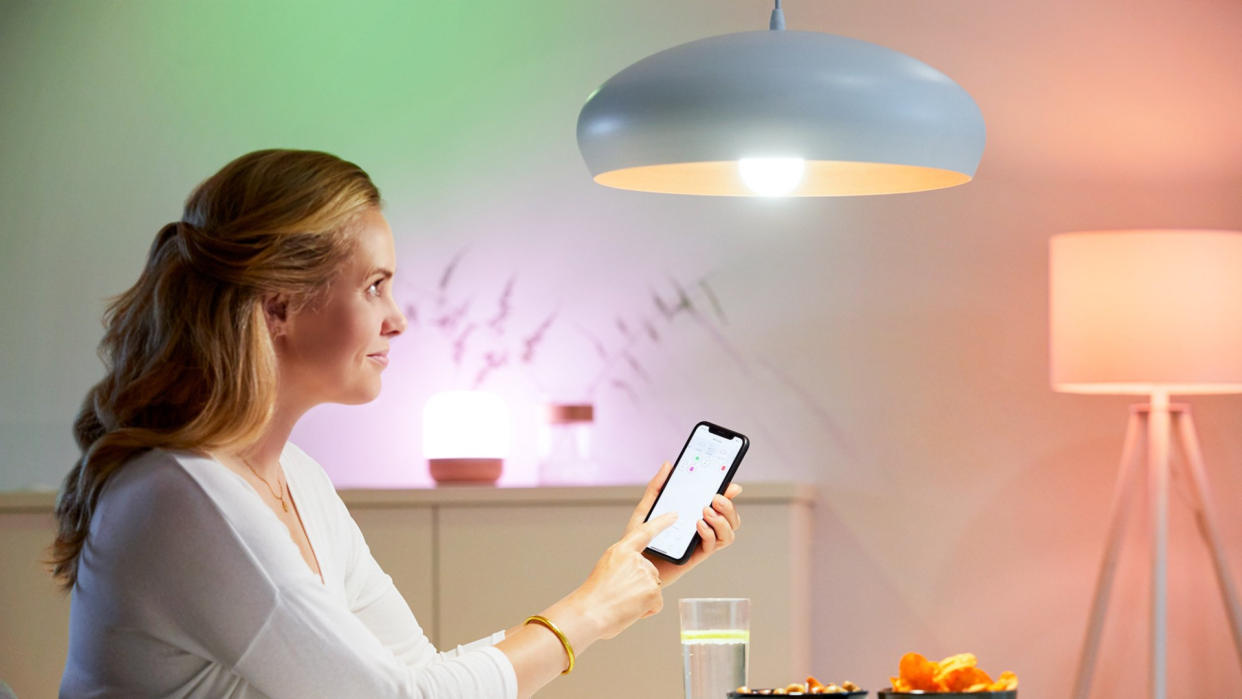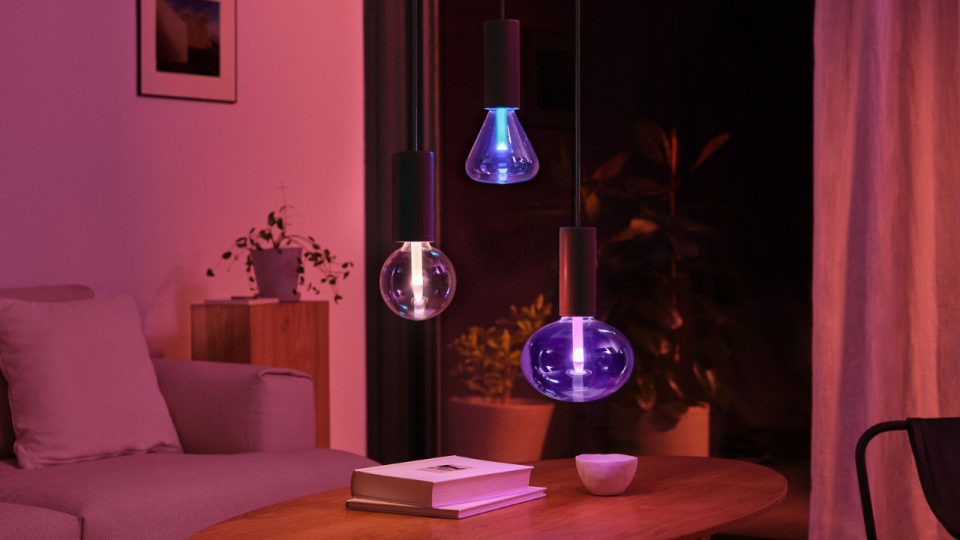Philips Hue vs WiZ: which smart home lighting is right for you?

The heatwave is over (thank goodness) and the cooler Autumn months are finally here. For me, there is simply nothing better than a cosy evening spent indoors when it's cold outside. Whether I'm snuggled up with a good book and a mug of tea, or watching a movie with friends, there's always one thing that stays the same. Can you guess what it is yet? Yep, my smart home lighting.
Ranging from the Philips Hue entertainment system to the WiZ smart outdoor string lights, I've been lucky enough to experience how smart lighting can instantly transform your home with just the press of a button. It gives you the ability to set any mood you'd like in your indoor or outdoor space, giving you all the lighting options you need. It's also no secret that Philips Hue and WiZ dominate the smart home lighting industry, producing some of the best products known on the market. However, this always raises one particular kind of question: which company should I buy my smart home lighting from?
Philips Hue and WiZ are both owned by Signify, meaning a lot of similarities naturally pop up between the two brands. Whilst WiZ is known for being cheaper, it still causes confusion whether the quality differs between the two, and whether there's one brand that smart home enthusiasts should stick with. Well, we're here to compare everything you need to know between Philips Hue and WiZ, so you can figure out which smart home lighting range will best suit your space.
Philips Hue vs WiZ: Products
In general, Philips Hue and WiZ produce a lot of similar products. Both brands focus on indoor lighting and outdoor lighting, as well as producing a lot of other smart home products that aren't related to lighting at all. One main difference between the two was that WiZ focused on smart home security as well as lighting, but this changed recently after Philips Hue's IFA 2023 announcement. Both brands now feature a range of smart security cameras and sensors, with the Philips Hue security products set to launch later this month.
One product that Philips Hue is known for is their LED smart lightstrip, a product that WiZ also features. However, Philips Hue have a range of four different lightstrips, including four different indoor lightstrips and two that are designed for outdoors. WiZ instead has two lightstrips, both designed for indoor lighting only.
Another similar product between the two brands is the Philips Hue Tap Dial Switch and the WiZ Smart Button. Both control buttons can be attached to the wall, giving users full control over their smart home lighting. However, the WiZ button simply allows users to turn their lights on/off and adjust brightness, whereas the Philips Hue Switch offers a huge amount of smart lighting control. Those with the Philips Hue Switch can even be programmed via the Philips Hue app, allowing you to personalise the Switch to however you want it to work.
Another prime example between the two brands is their range of portable lamps. Whilst WiZ does have a nice variety, including the portable Squire Table Lamp and the Portrait Desk Lamp, they are on the simple side. It's therefore when you take a look at the Philips Hue lamps, you can see that they just take precedent. Ranging from the Philips Hue Go Portable Table Lamp to the Gradient Signe Floor Lamp, both products provide a level of sleekness that the WiZ lamps struggle with.
I could go on and on, but the consensus is pretty clear. Both WiZ and Philips Hue offer very similar products, but when it comes to the quality and range, Philips Hue certainly seems to be the winner here.

Philips Hue vs WiZ: Features
Both Philips Hue and WiZ offer the basic set of functions you’d expect to see from any smart home lighting setup. No matter what products they have, users are able to control them from the Philips Hue or WiZ apps, both of which are available on IOS or Android. Both apps can also pair up with with smart home assistants, such as Amazon Alexa or Google Assistant, as well as an extended list due to being compatible with Matter. In fact, it was WiZ who were compatible with Matter first, with Philips Hue only announcing their amalgamation with Matter last month.
Philips Hue users are able to control their smart home in two different ways: via bluetooth or through the Philips Hue Bridge. Unlike WiZ which only works through bluetooth, the Philips Hue Bridge offers a huge amount of extra functions which can make a smart home even smarter. I won't go into them but read our piece on what it does and whether it's necessary for more information.
However, what's shocking to a lot of users is that the amount of lights you can connect to the WiZ system is a lot larger than what Philips Hue offers. When you're just using Bluetooth, you can only connect up to 10 Philips Hue lights in one room. This then expands to 50 when you control your lights via the Hue Bridge (see, I told you that there are more features available when you get a Bridge.) When it comes to WiZ, the amount of smart lighting products you can connect depends on your Wi-Fi router. Typically, routers support up to 250 devices in total, including devices such as computers, TVs etc. It would still be very hard to hit the limit of your router, so the WiZ system offers a lot more versatility than Philips Hue in that respect.
Both Philips Hue and WiZ lighting is also fully customisable, with both brands offering users a choice of 16 million different colours. However, through reviewing products from the two brands, I have always found that Philips Hue lights give off a slightly brighter cast than the WiZ lights.

Philips Hue vs WiZ: Price
Out of the two brands, it's no secret that Philips Hue is a more expensive brand than WiZ. If we compare their smart light bulbs, the Philips Hue models range from £15 to £50 for one singular bulb, whereas the WiZ bulbs are between £6 and £15. Another example includes the Philips Hue lightstrips which start from £130, compared to the WiZ lightstrips, starting at £30.
It's therefore clear that WiZ’s smart lighting is significantly more affordable than the products from the Philips Hue range.
Philips Hue vs WiZ: what's the verdict?
It's no doubt that both Philips Hue and WiZ offer convenient and accessible smart home lighting systems that can transform your home with just the press of a button. Whilst the smart home products that both brands feature are very similar, it's clear that Philips Hue is in the lead when it comes to range availability and product quality. However, if you're looking to start building your smart home and want to begin with a simplified system, then WiZ may be the brand to go for after all.
When it comes to the product features that both brands have, again, they're quite similar. Both Philips Hue and WiZ feature the same amount of colours and control methods, with Philips Hue being slightly more developed due to introducing the Hue Bridge as a control hub. You are able to add more WiZ products to your system over Philips Hue, but unless you have a mansion with over 50 rooms, then this may not be a priority for you.
It's also clear that WiZ is the more affordable option. Philips Hue has that sleek look that many people want for their home, but unfortunately there is a price tag attached to it.
Overall, you have to weigh up your priorities when it comes to choosing your smart home lighting system. If you're looking for products that are simple, easy to use and affordable, go for WiZ. If you're after a system where there are lots of products available that have a lot more advanced features, but you don't mind the hefty price tag, go for Philips Hue. It completely depends on what your preferences are!
Interested in more? Have a look at our guides on how to introduce smart lighting to garden or even how to create your own Barbie Dreamhouse using smart lighting!

